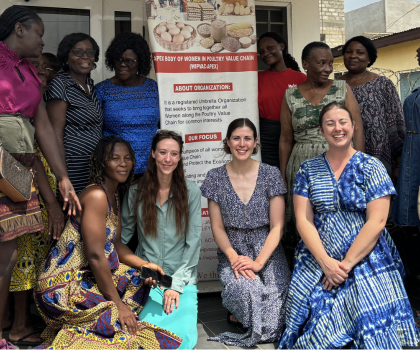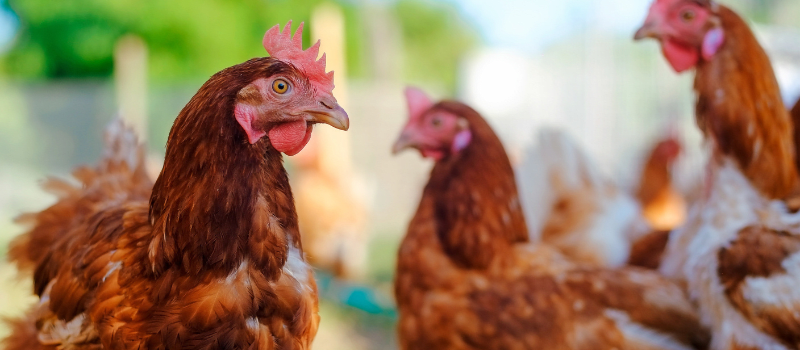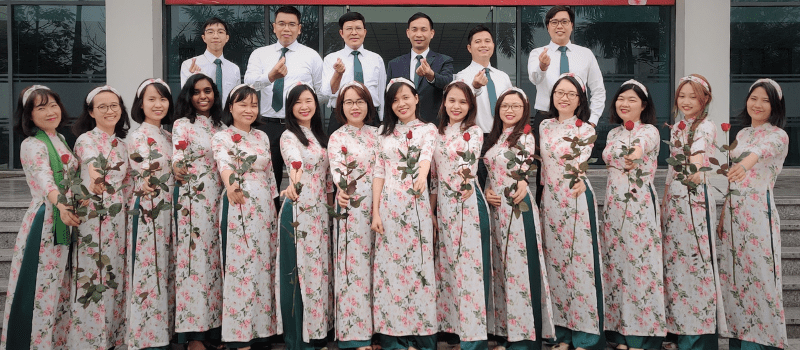#VETSVolunteerVoices aims to bring you the stories of our passionate VETS program volunteers from the field. This blog was written by Netanya Karmel, Animal Health Advisor Volunteer supporting our local partner in Ghana, Women in Poultry Value Chain (WIPVaC)-Apex (May - August 2024).
A Journey from Vegetables to Poultry
Horlase Anku is an organic vegetable and poultry farmer from Akwapim South, in Ghana's Eastern Region. Her journey began with vegetables, and she shares, "It has been a tough journey, but I love what I do. I go to my farm, speak to my plants, and ask them why they're dying. Then I come back in the evening, see them thriving, and say, 'Yes, I told you, you could do it.'" Horlase’s caring, upbeat, and hardworking nature shines through in everything she does. This spirit has enabled her to build a thriving poultry business from the ground up.
One day, while tending to her vegetables, Horlase's friends suggested she add poultry farming to her repertoire. Despite having no prior experience in the poultry industry, she took their advice and embarked on this new venture. She started with 200 birds in her mother’s barn in Medina—a challenging but rewarding endeavor. Through her own online research and a lot of trial and error, Horlase—fondly referred to by her friends as the “internet farmer”—learned the ins and outs of the commercial poultry industry in Ghana.
Learning and Growing with WIPVaC-Apex Ghana
Midway through her poultry career, Horlase was invited to join Women in Poultry Value Chain (WIPVaC)-Apex Ghana. WIPVaC-Apex is a member-based organization dedicated to supporting women in the poultry industry, helping them enhance their production and capacity.
 PHOTO: Horlase Anku, vegetable and poultry farmer
PHOTO: Horlase Anku, vegetable and poultry farmer
 PHOTO: Horlase and Netanya Karmel (VETS Volunteer)
PHOTO: Horlase and Netanya Karmel (VETS Volunteer)
 PHOTO: Horlase with VETS volunteers and WIPVaC-Apex Ghana
PHOTO: Horlase with VETS volunteers and WIPVaC-Apex Ghana
When asked about her experience with WIPVaC-Apex Ghana, Horlase credits the organization with much of her poultry knowledge. “Apex has been wonderful; I didn’t have a clue what I was doing in poultry farming. It was when I joined the group that I learned the important things.” She recalls an early meeting where she arrived distraught after losing a chicken. When she explained her distress, another member looked at her and said, “I lost 50.” Other women had lost 5, 10, or 20 birds. This interaction was eye-opening for Horlase, as she realized that losing birds is part of the poultry farming journey. Instead of dwelling on the losses, she learned to focus her energy on preventing future fatalities.
The Impact of VWB’s VETS Program
This is where the work of Veterinarians Without Borders (VWB) and the VETS program becomes especially valuable. WIPVaC-Apex Ghana is the newest partner of VWB’s VETS program, hosting its inaugural group of Emerging Leaders Program (ELP) volunteers from May to August 2024.
Through this partnership, Horlase received a visit from four VETS volunteers. Their goal was to share ideas on how Horlase could improve biosecurity for her current flock of 150 layers and ultimately enhance bird health to maximize egg quality and quantity. What makes this partnership so powerful is that once Horlase receives guidance from the VWB VETS project, she can use this knowledge to educate her staff, other WIPVaC-Apex farmers, and many others in the poultry farming community, fostering growth and sustainability long after the volunteers have left Ghana.
PHOTO: VETS volunteers and Apex staff visit Horlace's poultry farm to conduct biosecurity check and consultation. (Horlace is in front row wearing orange t-shirt.)
The Power of Collaboration and Knowledge Sharing
As a member of WIPVaC-Apex Ghana, Horlase cherishes the opportunity to collaborate and share knowledge. Her commitment to knowledge sharing was evident even before she entered the poultry business. During a visit to a local vegetable farm, she asked where they sourced their seeds, only to be told it was a "trade secret." This response left her dismayed. “There are 3 million people in Ghana, and our farms can’t even feed 1% of those people. Why keep the information to ourselves?”
WIPVaC-Apex Ghana fosters a spirit of collaboration among farmers, which is what Horlase loves most about being part of this organization. Through her membership, she shares information, asks questions, and helps grow both her own business and her community. Watching her interact with her farm workers and other WIPVaC-Apex members, it’s clear that Horlase is a successful, respected, and beloved figure in her industry.
A Community Built on Love and Support
When asked about her biggest takeaway since joining WIPVaC-Apex Ghana, Horlase reflects on the support she receives. “I keep coming back because of the love I get. I can be myself here, and I can call anyone at any time.” She recalls a day when she called Victoria Norgbey, President of WIPVaC-Apex Ghana, saying, “Momma Vic, I’m having a problem,” and Victoria responded immediately to offer advice. “It’s the love and support that keeps me coming back. Even those with a lot of experience keep coming back, not because they need help, but because of the support.”
Horlase exemplifies community collaboration. During a meeting with WIPVaC-Apex members, she learned that some of the VETS volunteers were struggling to find good produce to make salads. Within minutes, she was on the phone with one of her workers: “I have new friends who are missing salad; please prepare some packages for them.” It’s small acts of kindness like these that highlight the remarkable woman Horlase is. WIPVaC-Apex Ghana is full of women like her, creating an extraordinary network of collaboration, support, and guidance for those in the poultry value chain.
The partnership between VWB and WIPVaC-Apex Ghana is just beginning, but the positive outcomes in knowledge sharing and collaboration are already clear. It is people like Horlase who shape this relationship in powerful ways, paving the way for other women in the poultry value chain to succeed.
VETS is a 7-year initiative (2020-2027) to improve the economic and social well-being of marginalized people, particularly women and girls, in 6 countries across Africa and Asia. In collaboration with local partners, the program is implemented through 190 Canadian volunteers on international assignment and is generously funded by Global Affairs Canada. Learn more.





